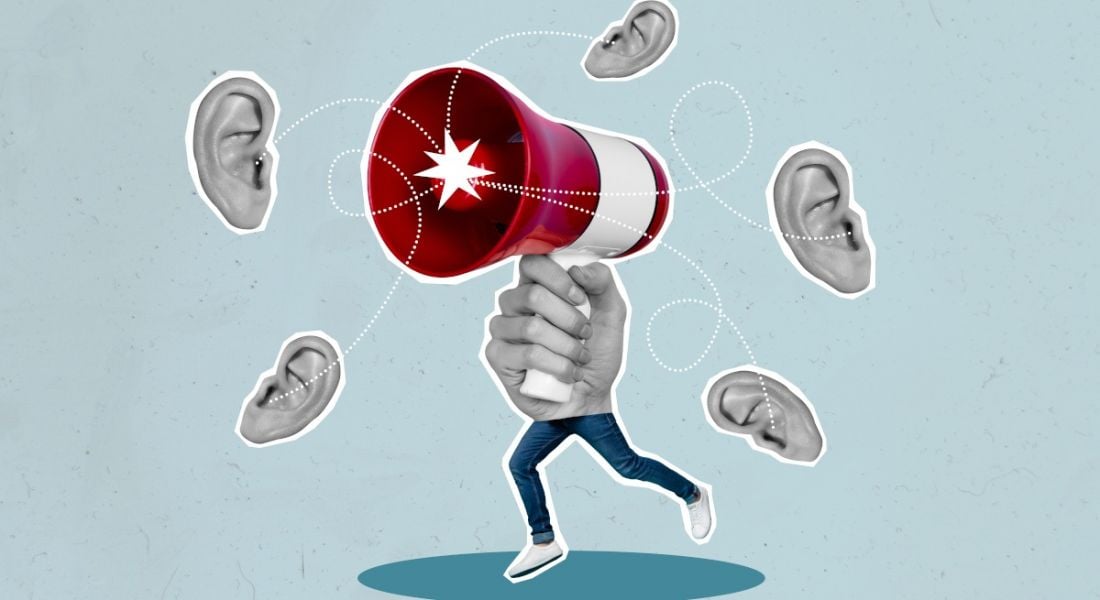Join a Toastmasters group, don’t rely on the infallibility of PowerPoint and remember to relax and take your time when public speaking.
Public speaking means different things to different people. For some, it’s standing at a podium and giving a formal speech to a crowded room full of people. For others, even contributing at a small team meeting can seem daunting enough to be considered ‘public speaking’.
Public speaking – however you define it – is not a skill that comes naturally to most of us. And yet, at some point in everyone’s career, they will be required to do it. So, whether you love it, don’t mind it or absolutely dread it, here are a few strategies to consider whenever you have your next audience.
Know your audience
Public speaking is not unlike delivering a sales pitch. You have to sell your point of view and sometimes you might have to sell the idea that you’re a natural public speaker even if you’re quaking inside and you’ve been up all night preparing slides. You can convince your audience that you’re in control of the situation by showing them that you know what they want to hear.
Who are you talking to? Tailor your language and body language to your audience, whether it’s a room full of business people or a stadium full of schoolchildren.
Embrace levity, where appropriate
If you feel comfortable doing so, crack a joke or a smile before you begin to settle your nerves and reassure the audience that you’ve got this. Of course, if you’re delivering the annual results and they’re very, very bad – cracking jokes is not called for. Use your common sense and read the room.
Another reason you should lighten up a little bit when you’re speaking to an audience is for your own sanity. Yes, public speaking is daunting but you’re not delivering the Gettysburg Address, so relax a little. Loosen up and don’t take yourself so seriously; there is a fine line between wanting to do well and caring so much about what people think of you that you get in your head and start critiquing yourself. Don’t be your own worst enemy and remember that people want you to do well. Keep that thought in mind any time the self-doubt starts to creep in.
Fail to prepare, prepare to fail
A great way of reducing your nerves is to do a lot of preparation in advance of your public-speaking engagement. It’s a very rare person who can leap up out of their chair and deliver a great talk with no notes or nothing prepared.
Most people need to prepare not only their material and what they are going to say in advance, but also how they are going to say it. You should time yourself speaking a couple of times before you give your presentation to make sure it’s not too short or too long. Eliminate any words or clunky phrases you find sound unnatural to you and even try to memorise some of the main points you want to make so you don’t have to be constantly looking at your notes.
Make sure your tech works
Technology can be an asset or a nightmare depending on your luck on the day. Whether you’re using some PowerPoint slides or you have a team of videographers and sound technicians on call, you need to do a bit of troubleshooting before you start. Ask for some time to get yourself set up before you begin. This is part of preparation.
If you do have technical difficulties and you did prepare, just consider yourself unlucky. We’ve all endured the pain of a PowerPoint presentation suddenly freezing at the most inconvenient moment possible. It’s good to have a backup plan just in case a tech disaster does happen. Usually, this is where your moment of levity comes in and you just apologise and tell your audience they have to look at you instead of your slides.
Use psychological persuasion strategies
If you really want to improve your public-speaking skills and take them to the next level, consider looking to psychology for tips. There is a whole field of psychology dedicated to persuasion. Dr Robert Cialdini’s book called Influence: The Power of Persuasion explains some of the science behind how people are won over.
Come out of your shell
If you are forewarned that you have to work on your public-speaking skills, it’s a good idea to try and take the pain out of it by doing something fun. Consider joining an amateur drama group, or your local Toastmasters chapter. Toastmasters is an international organisation made up of lots of local chapters that meet regularly to practice public speaking in an informal way.
Learn from the best
Martin Luther King Jr, Malala Yousafzai, Winston Churchill, Greta Thunberg, Steve Jobs, Mark Zuckerberg, Abraham Lincoln. However you feel about them and the content of their speeches, all of these people are considered good orators. They are persuasive, passionate, self-assured and intelligent. They also know their own power and their own ability to capture a moment and say something meaningful – or that means something to someone. Watch how these people speak and how they hold themselves when they are delivering an address.
10 things you need to know direct to your inbox every weekday. Sign up for the Daily Brief, Silicon Republic’s digest of essential sci-tech news.




